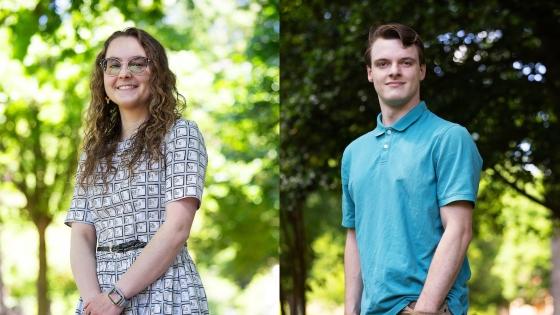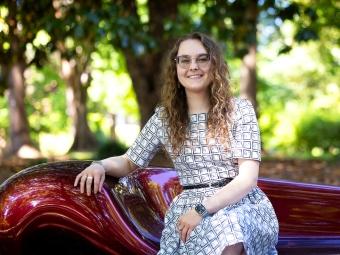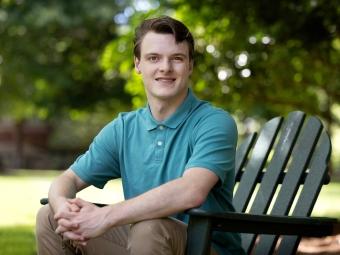Davidson College Goldwater Scholars Apply Math, Immunology Research to Widespread Problems

Izzie Meyers ’25 has committed to studying immunology to find better treatment and potential cures for autoimmune disorders. Kenan Wood ’25 has worked on computer programs to make financial transactions more secure and consumer friendly.
The two Davidson College students are among 438 new Goldwater Scholarship recipients for the 2024-2025 academic year. More than 5,000 students from colleges across the United States applied for the award, which recognizes undergraduates who plan to pursue research careers in the natural sciences, mathematics and engineering.
Considered the “preeminent undergraduate award of its type in these fields,” the Goldwater Scholarship was founded by the U.S. Congress in 1986 to honor former U.S. Senator Barry Goldwater.
Here’s a little bit more about Meyers and Wood.
Izzie Meyers ’25
When Izzie Meyers’ younger brother Zac started losing weight and energy and was excessively thirsty all the time, the family’s journey with Type 1 diabetes began.
Their mom, Melissa, recognized the symptoms early on and got him to a doctor. That quick medical attention and diagnosis helped protect Zac, then 11, from the potentially life-threatening consequences of his pancreas’s inability to produce enough insulin.
Izzie Meyers remembers how Zac learned to adjust to a routine of monitoring blood sugar, carefully scheduling meals and counting carbohydrates. Melissa Meyers set a 3 a.m. alarm each night to check on him.
Unlocking the puzzles of diabetes and other autoimmune diseases and seeking better treatments and cures has since become a lifelong goal for Izzie Meyers. At Davidson, she majors in biology, with a minor in Hispanic Studies, participated in the Duke-Davidson Immunology Partnership, and is a North Carolina GlaxoSmithKline Foundation Women in Science Scholar. She has impressed professors with her intellect, determination, work ethic and desire to learn more.
“I have worked with Izzie practically from the first day she set foot at Davidson,” said Sophia Sarafova, an associate professor of biology. “Right there and then she declared that she would do immunology research because she wanted to help people with autoimmune diseases. It was a great pleasure to interact with her over the past three years as she made good on her promise and then some. She has been an outstanding addition to my lab, working both hard and smart, which will result in an honors thesis next semester.”
This past January, Meyers received the prestigious Ray Owen Poster Prize, normally awarded to graduate students, at the Midwinter Conference of Immunologists at Asilomar. Her presentation centered on her lab research and discoveries related to T cell development. The crucial cells help protect the body from infection.
“I love the problem-solving aspect of this kind of research,” she said. “It’s so great to start with this hypothesis, and whether it works or it doesn’t, you learn, that’s a yes, or that’s a no. And if it’s a no, how can I modify this so that it does work?”

Wanting to Know Why
Meyers grew up in suburban Pittsburgh and has three younger brothers, including Zac. She has her own autoimmune issues, including Celiac disease, as well as dairy, egg and peanut allergies.
“I’m the problem child of the family,” she joked. “And I’m the one who turned to science to figure out why. Is it environmental — some kind of toxin, or a virus? These are all areas I want to research.”
She attended a large public high school in Pittsburgh and came to Davidson because she wanted a smaller college where she could conduct graduate-level research as an undergraduate.
She’s worked in the laboratory at the Rangos Research Center at the University of Pittsburgh Medical Center Children’s Hospital during college breaks. She’ll spend half of this summer at Rangos, and the second half in Zambia with the Davidson in Mwandi program.
After graduation next year, she plans to pursue a dual M.D./Ph.D. in immunology. She’d like to work with children. As a physician-scientist, she will conduct research leading to treatments and cures for autoimmune diseases like Type 1 diabetes. Her other interests are varied, and extensive.
“Don’t make the mistake of thinking about Izzie in just one dimension,” Sarafova said. “Our conversations during long incubation times in the lab went in all directions, especially second language acquisition, the oddities of the half a dozen languages we know between us — (none overlapping other than English) — culinary escapades, and world travel.
“I am looking forward to finding out how she will apply all of her talents for the betterment of society in the fields she chooses to pursue.”
That will involve spending a lot of time in laboratories, which is just fine with Meyers.
“The lab is definitely my happy place at Davidson,” she said. “I’ve loved every minute of it.”
She’s hopeful about future medical breakthroughs, especially when she sees better methods of controlling diabetes. You can look to her brother Zac as proof. As insulin pumps and knowledge about the disease have improved, his life has, too.
Now 17 and a healthy, active high school athlete, he’s a standout cook and plans to go to culinary school to become a pastry chef.
Kenan Wood ’25
If you worry about the security of financial transactions or getting the best deal on your travel plans, Kenan Wood ’25 is on the case.
Wood, whose early proclivity for mathematical mysteries had him taking high-level courses as a young kid, designs programs to make things such as trading cryptocurrency and buying airline tickets safe from hackers and a better deal for consumers.
His research revolves largely around an area of trading known as expiring assets. Think empty seats on planes or available rooms at resorts. If they’re not booked, everyone’s losing. But with more efficient programming, those seats and rooms get filled, consumers save money, and airlines and resorts still make money.
That involves fine-tuning application systems so that computers everywhere would immediately sync to accurately reflect quickly changing data.
“How do you get all the computers in the world to agree?,” Wood said. “If I pay for something in cryptocurrency, you have to have everyone agree that it was paid, and here’s how much was paid. You can’t have ambiguity.”

Thinking Outside of the Box
Wood grew up on his grandfather’s cattle farm near Asheville, North Carolina. He developed a deep love for the outdoors, spending time hiking, fishing, hunting and competing in archery contests.
His mom, Rexann Wood, who’d majored in chemistry and botany in college, homeschooled him and his four younger siblings. He was about five when he developed a strong interest in and excitement about math. His parents enrolled him in an advanced math club, where he excelled through his middle and high school years.
“That really helped me grow, and learn how to solve problems,” he said. “And it really deepened my interest in research.”
He came to Davidson on a Golden LEAF Scholarship, which supports students from underrepresented areas of North Carolina who attend participating colleges in the state and plan to return to their communities.
In his freshman year, he started research with Jonad Pulaj, assistant professor of mathematics and computer science at Davidson. Pulaj supported Wood’s research with funding through that summer. That fall, Pulaj brought Wood into an ongoing collaboration with Hammurabi Mendes, associate professor of mathematics and computer science, and Maurice Herlihy, a computer science professor at Brown University.
The team’s research centered around Automated Market Makers (AMMs), a type of exchange that uses algorithms to trade digital assets.
Mendes describes how Wood proposed applying geometry concepts to complex programming issues so that computers in large networks would align. He said Wood wrote the mathematical proofs for a paper the team has submitted for publication.
His research “is essentially a mathematical and computational framework for trading assets electronically,” Mendes said.
Impressed with Wood’s research, Pulaj encouraged him to apply for the Goldwater scholarship.
“Having closely worked with and overseen Kenan’s research progress over the past two years, I was deeply impressed with his independence, creativity and passion while tackling and making progress in non-trivial problems both in mathematics and computer science,” Pulaj said. “This rare combination of traits, together with a strong sense of intellectual curiosity and a desire to pursue research at the highest levels made Kenan an ideal candidate for the Goldwater Scholarship.”
A recipient of Davidson’s Sophomore Computer Science Award and William D. Vinson Mathematics Award, Wood has delved into research about ensuring computers in a network remain in sync, despite attacks and network errors. A paper on that research has also been submitted for publication.
His long-term goals are to pursue a Ph.D. in distributed computation and continue conducting research on secure distributed systems and provable cryptographic security — and his experience at Davidson has prepared him well for the rigors of graduate study and research.
“Kenan operates as a graduate student: we propose problems and general approaches, and he comes back with detailed analysis and ideas of his own,” Mendes said. “He is very strong technically. He listens very carefully to other people’s comments, engages actively in the conversation, and gives suggestions in a kind, open manner, always maintaining a high technical and intellectual level.
“He is an exemplar, and a gentleman.”
The Goldwater competition is administered at Davidson College through the Office of Fellowships. For more information about the Office of Fellowships or applying for the Goldwater Scholarship, visit www.davidson.edu/fellowships.
Published
- May 8, 2024
Category
-
Scholarships